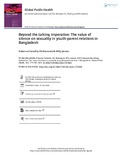| dc.contributor.author | Camellia, Suborna | |
| dc.contributor.author | Rommes, Els | |
| dc.contributor.author | Jansen, Willy | |
| dc.date.accessioned | 2022-05-10T04:38:56Z | |
| dc.date.available | 2022-05-10T04:38:56Z | |
| dc.date.copyright | 2020 | |
| dc.date.issued | 2020-04-15 | |
| dc.identifier.citation | Camellia, S., Rommes, E., & Jansen, W. (2021). Beyond the talking imperative: The value of silence on sexuality in youth-parent relations in Bangladesh. Global Public Health, 16(5), 775-787. doi:10.1080/17441692.2020.1751862 | en_US |
| dc.identifier.uri | http://hdl.handle.net/10361/16583 | |
| dc.description | This article was published in The Global Public Health by Tayo [ © 2020 The Author(s). Published by Informa UK Limited, trading as Taylor & Francis Group This is an Open Access article distributed under the terms of the Creative Commons Attribution-NonCommercial-NoDerivatives License (http:// creativecommons.org/licenses/by-nc-nd/4.0/)] and the definite version is available at: https://doi.org/10.1080/17441692.2020.1751862 The Journal's website is at: https://www.tandfonline.com/doi/full/10.1080/17441692.2020.1751862 | en_US |
| dc.description.abstract | Research conducted in various parts of the globe suggests that young people who can openly communicate with their parents about sexuality benefit in many ways. Correspondingly, in Bangladesh, the lack of an open communication on sexuality in the youth–parent relationship is considered a barrier to ensuring young people’s sexual and reproductive health and overall well-being. Taking ‘silence’ as a core concept, this paper investigates what silence on sexuality means to Bangladeshi young people in their relationship with parents. It draws on findings from an ethnographic study conducted among 72 middle-class boys and girls aged between 15 and 19 years and 18 parents living in Dhaka over a year between 2016 and 2017. The findings suggest that silence is not always perceived as problematic by young people, and this is particularly true for topics related to sexual pleasure. This paper challenges the monolithic understanding that silence is necessarily bad and hinders young people from getting what they need. It offers an additional conceptual understanding to silence for studying sexuality among youths and designing interventions for their sexual and reproductive well-being. | en_US |
| dc.language.iso | en_US | en_US |
| dc.publisher | Taylor & Francis | en_US |
| dc.relation.uri | https://www.tandfonline.com/doi/full/10.1080/17441692.2020.1751862 | |
| dc.subject | Sexuality | en_US |
| dc.subject | Youth | en_US |
| dc.subject | Silence | en_US |
| dc.subject | Middle-class | en_US |
| dc.subject | Bangladesh | en_US |
| dc.title | Beyond the talking imperative: The value of silence on sexuality in youth-parent relations in Bangladesh | en_US |
| dc.type | Journal Article | en_US |
| dc.description.version | Published | |
| dc.contributor.department | Brac James P. Grant School of Public Health | |
| dc.identifier.doi | https://doi.org/10.1080/17441692.2020.1751862 | |
| dc.relation.journal | Global Public Health | |

